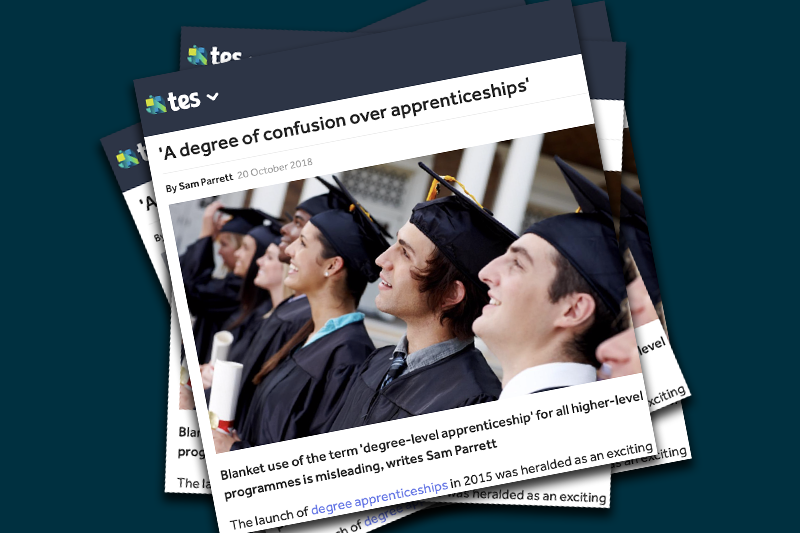The launch of degree apprenticeships in 2015 was heralded as an exciting opportunity to develop employer-focused higher education, by businesses and universities alike.
At a time when the skills gap was growing exponentially, it was clear that degree apprenticeships could play a role in meeting employers’ skills needed while widening participation, supporting social mobility and boosting local graduate recruitment.
The win-win of gaining a degree while getting on-the-job experience and getting paid is a very valuable alternative pathway for young people.
The availability of degree apprenticeships undoubtedly raises the esteem of apprenticeships as a whole. They open up HE opportunities to a far greater range of people and support social mobility by providing the chance for someone to gain a degree while earning a wage.
Studying for a full time degree is an impossible for option for many people financially – a degree apprenticeship can make gaining a higher level qualification a reality.
Yet we are now facing a situation where the Institute of Apprenticeships (IfA) wants to remove degrees from apprenticeship standards, unless required by a regulator or professional body. The reason for this is seemingly the desire of the IfA to establish the Apprenticeship certificate as a qualification.
Alongside this, the DfE is now using the term ‘degree-level apprenticeship’ to describe all apprenticeships at Level 6. These do not need to include a Bacherlor’s or Master’s degree – they are simply determined by the IfA (and its Trailblazers) to be ‘at degree level’.
For me, this classification is troublesome. The term ‘degree’ is a protected one, yet being used in this way is potentially misleading as ultimately the programme does not include a degree programme and may in fact not even relate to one.
You then have the issue of who is actually responsible for determining what constitutes a degree level apprenticeship if it doesn’t include an actual HE qualification?
In both the national and international market, a degree carries strong currency. But how will a ‘degree-level’ apprenticeship fare? How will these be marketed and explained to employers? Without degree awarding powers, I’d also question the validity of the IfA issuing certificates which are claiming to be ‘degree level’.
All types of apprenticeships are vital to businesses and the economy a whole, but we must consider the way they are classified in order to maintain the value of both them and of degrees.
Gaining a traditional degree is getting increasingly more expensive. Many graduates question the value of their hard work following 3-4 years of study and no guarantee of a job. Universities rarely provide quality careers advice and little care is given to help support students into jobs after graduation.
There are few links between traditional universities and employers - in contrast with the FE approach – and the focus is on the qualification rather than the all-important destination. But degree apprenticeships are helping to bridge this gap and enabling universities to form better links with industry, supporting their students into great careers.
I believe that by dropping degrees from apprenticeship standards, we are in danger of fewer degrees being used in apprenticeships and thus losing these valuable and employer-focused routes into higher education.
There are some senior voices within the sector expressing concern about degree apprenticeships. Skills Minister, Anne Milton, made the point at last week’s Conservative Party Conference that we are running the risk of reinforcing the idea that a degree is the only option for success. She made the point that 50% of people DON’T go to university, and for many of them, it’s FE that plays a vital part.
I agree that there are many, very good jobs available at levels 4 &5 and of course, FE is a huge facilitator of social mobility and second chances. A degree is not the be all and end all when it comes to success and we work hard to promote apprenticeships as being a fantastic alternative pathway to the traditional A Level / university route.
Yet this isn’t about taking FE out of the equation or about taking the degree out of the degree apprenticeship. It’s about making career-focused education accessible to as many people as possible by creating high quality, clearly classified employer-driven qualifications to promote progression and aspiration.
By Sam Parrett OBE, Principal and CEO of London South East Colleges
To read the story in TES click here

